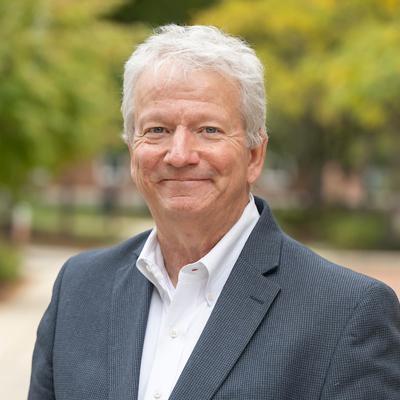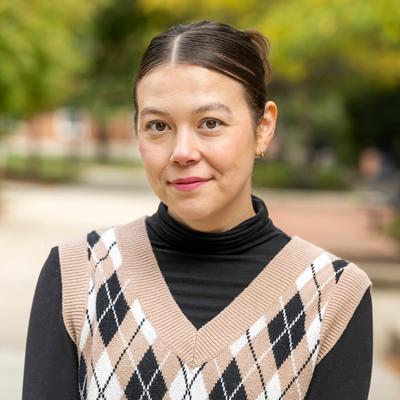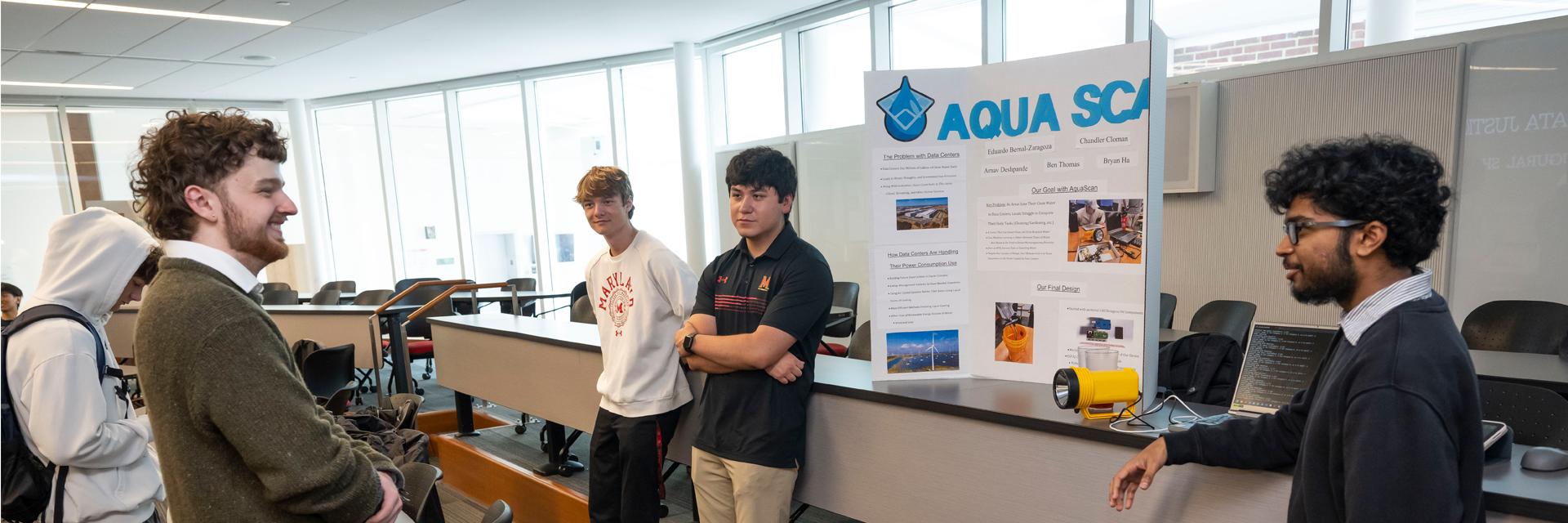Data Justice
Information, analytics and computing for social change
Introduction
Data Justice (DJ) provides students an opportunity to interrogate the biases that are built into information collection, design, and analysis. Students explore how specific values are coded into datasets, algorithms, AI-driven systems, machine learning models, and other sociotechnical systems. They gain advanced data-related skills that will serve them in a wide variety of careers that aim to make the world a better place through information.
By the conclusion of the program, students will be able to:
- Employ justice-centered approaches to equitable computer and data sciences;
- Analyze how cultural values, power, and privilege are encoded into technologies;
- Critique the sociopolitical values of data structure and algorithmic design;
- Analyze ways that computing and data science have been used as a catalyst for positive social change; and
- Develop a computing identity that intersects with personal identity factors.
DJ Scholars enters its second academic year in 2025-26. The program is sponsored by the University of Maryland’s College of Information (INFO), a top-ranked research and teaching college in the field of information science.
In INFO, faculty, staff, students, and partners are expanding the frontiers of how information and technology are accessed and used in a rapidly evolving world. We are combining principles of information science with cutting-edge technology to foster access to information, improve information interfaces, and expand how information is used in an evolving world.
Throughout all of our endeavors, INFO is committed to utilizing information and technology for good – to connect communities, empower individuals, and create opportunities.
Colloquium and Lecture Topics
- How do you use information?
- What is the info you need to change the world?
- What has produced the digital divide?
- How are digital identities different from personal identities?
- How can we achieve information justice?
Other Learning Opportunities
In addition to colloquium and supporting courses, DJ students will choose three 1-credit electives from a group of courses focused on building technical computing and data science skills. Course titles include:
- Making Twitter Bots
- Solving Puzzles and Riddles with Computation
- Comic Books and Machine Learning
- Emergent Experiences through Technology
Off-campus excursions to information-related sites, such as the Library of Congress, the National Archives, and the Agricultural Library in Beltsville, MD, will foster community and encourage examination of information in the community (in physical location, cyberspace, and institutions created for the management and best use of information).
Curriculum Overview
Data Justice is an 15-credit program that includes a required course on algorithmic bias (INST204S); a series of colloquium courses on the topics of the digital divide, digital identities, and information justice; a set of supporting courses drawn from the College of Information’s 100- and 200-level courses on relevant current issues; a set of short supporting courses focused on technical computing and data science skills; and a practicum (CPDJ240 Service Learning) in which students will undertake a project with a community partner related to data justice.
The following table represents a typical two-year curriculum, but individual schedules will vary. Details about courses and requirements can be found on the Data Justice Citation Checklist.
| SEMESTER | COURSE | CREDITS |
|---|---|---|
| Semester 1 | CPDJ 100: Colloquium I | 1 credit |
| INST204S: Designing Fair Systems (DSHS, SCIS) | 3 credits | |
| Semester 2 | CPDJ 101: Colloquium II | 1 credit |
| Semester 3 | CPDJ 200: Colloquium III | 1 credit |
| Semester 1, 2, 3, or 4 | INST 388: Maker Movement INST 388: Maker Movement INST 388: Maker Movement |
1 credit 1 credit 1 credit |
| Semester 1, 2, 3, or 4 | Supporting Course (var. Gen Ed) | 3 credits |
| Semester 4 | CPDJ 240: Service-Learning Practicum | 3 credits |
Sponsoring College
Office Address
1101 Centreville
Office Phone
TBD
Faculty


News and Notes, Etc.
StreetCarSuburbs, 14th Good Neighbor Day engages volunteers, Oct. 2025
Maryland Today, Courses Bring Comfort to Learning Computing, Oct. 2025
Two New Programs Added to College Park Scholars
Data Justice News
14th Good Neighbor Day engages volunteers
Students from Data Justice were among many College Park Scholars programs participating in the 2025 edition of Good Neighbor Day throughout the city of College Park and surrounding areas.
14th Good Neighbor Day engages volunteers
Students from Data Justice were among many College Park Scholars programs participating in the 2025 edition of Good Neighbor Day throughout the city of College Park and surrounding areas.
14th Good Neighbor Day engages volunteers
Students from Data Justice were among many College Park Scholars programs participating in the 2025 edition of Good Neighbor Day throughout the city of College Park and surrounding areas.
Courses Bring Comfort to Learning Computing
From knitting to music making, hobbies serve as entry points to explore AI, algorithms, programming, and more. Nearly a dozen one-credit, half a semester Maker Movement Approach to Computing (MMAC) classes at the University of Maryland use students’ personal interests as a low-stakes on-ramp to learn about technology.In the knitting class, you can find Felix Baum ’29, a computer science and linguistics double major in College Park Scholars’ Data Justice program.
Courses Bring Comfort to Learning Computing
From knitting to music making, hobbies serve as entry points to explore AI, algorithms, programming, and more. Nearly a dozen one-credit, half a semester Maker Movement Approach to Computing (MMAC) classes at the University of Maryland use students’ personal interests as a low-stakes on-ramp to learn about technology.In the knitting class, you can find Felix Baum ’29, a computer science and linguistics double major in College Park Scholars’ Data Justice program.
Courses Bring Comfort to Learning Computing
From knitting to music making, hobbies serve as entry points to explore AI, algorithms, programming, and more. Nearly a dozen one-credit, half a semester Maker Movement Approach to Computing (MMAC) classes at the University of Maryland use students’ personal interests as a low-stakes on-ramp to learn about technology.In the knitting class, you can find Felix Baum ’29, a computer science and linguistics double major in College Park Scholars’ Data Justice program.
Three Scholars Named ODK Top Ten Freshmen
Omicron Delta Kappa (ODK) is a nationally recognized leadership honor society. The Sigma Circle of Omicron Delta Kappa Leadership Society annually recognizes the Top Ten Freshmen of the University of Maryland.
Three Scholars Named ODK Top Ten Freshmen
Omicron Delta Kappa (ODK) is a nationally recognized leadership honor society. The Sigma Circle of Omicron Delta Kappa Leadership Society annually recognizes the Top Ten Freshmen of the University of Maryland.
Three Scholars Named ODK Top Ten Freshmen
Omicron Delta Kappa (ODK) is a nationally recognized leadership honor society. The Sigma Circle of Omicron Delta Kappa Leadership Society annually recognizes the Top Ten Freshmen of the University of Maryland.
Scholars Demonstrate Diverse Talents at Academic Showcase
Launched in 1997, the annual College Park Scholars Academic Showcase took place Friday evening at the Edward St. John Learning and Teaching Center. Students from 11 different Scholars programs presented slideshows, posters and more that reflected on their experiential learning outside of the classroom.
Scholars Demonstrate Diverse Talents at Academic Showcase
Launched in 1997, the annual College Park Scholars Academic Showcase took place Friday evening at the Edward St. John Learning and Teaching Center. Students from 11 different Scholars programs presented slideshows, posters and more that reflected on their experiential learning outside of the classroom.
Scholars Demonstrate Diverse Talents at Academic Showcase
Launched in 1997, the annual College Park Scholars Academic Showcase took place Friday evening at the Edward St. John Learning and Teaching Center. Students from 11 different Scholars programs presented slideshows, posters and more that reflected on their experiential learning outside of the classroom.
Five Scholars Community Members Named Provost's Do Good Innovator Award Recipients
In partnership with the Office of the Provost, the Innovator Awards highlight the incredible members of our campus community who create, nurture, expand and amplify social impact throughout education, programs and research, both inside and outside the classroom. These dedicated Terps were nominated by their colleagues who recognized the broad and meaningful impact they create. Over the past academic year, members from the Do Good Campus Strategic Leadership Council reviewed nominations and selected their awardees, with some units opting to fund additional awards. Congratulations to:
Five Scholars Community Members Named Provost's Do Good Innovator Award Recipients
In partnership with the Office of the Provost, the Innovator Awards highlight the incredible members of our campus community who create, nurture, expand and amplify social impact throughout education, programs and research, both inside and outside the classroom. These dedicated Terps were nominated by their colleagues who recognized the broad and meaningful impact they create. Over the past academic year, members from the Do Good Campus Strategic Leadership Council reviewed nominations and selected their awardees, with some units opting to fund additional awards. Congratulations to:
Five Scholars Community Members Named Provost's Do Good Innovator Award Recipients
In partnership with the Office of the Provost, the Innovator Awards highlight the incredible members of our campus community who create, nurture, expand and amplify social impact throughout education, programs and research, both inside and outside the classroom. These dedicated Terps were nominated by their colleagues who recognized the broad and meaningful impact they create. Over the past academic year, members from the Do Good Campus Strategic Leadership Council reviewed nominations and selected their awardees, with some units opting to fund additional awards. Congratulations to:
Two More Programs Added to Scholars for 2024-25
COLLEGE PARK, MD. – College Park Scholars in Fall 2024 will add two programs to its roster of two-year living-learning experiences for academically talented students, but one will look and sound familiar.Data Justice will debut, and the University of Maryland’s CIVICUS program will relaunch with a new name: Civic Engagement for Social Good.The expansion will bring the number of Scholars programs to a record of 13 and provide 150 additional first-year students with the opportunity to begin their college journeys as members of an intellectually rich and socially vibrant Scholars community.
Two More Programs Added to Scholars for 2024-25
COLLEGE PARK, MD. – College Park Scholars in Fall 2024 will add two programs to its roster of two-year living-learning experiences for academically talented students, but one will look and sound familiar.Data Justice will debut, and the University of Maryland’s CIVICUS program will relaunch with a new name: Civic Engagement for Social Good.The expansion will bring the number of Scholars programs to a record of 13 and provide 150 additional first-year students with the opportunity to begin their college journeys as members of an intellectually rich and socially vibrant Scholars community.
Two More Programs Added to Scholars for 2024-25
COLLEGE PARK, MD. – College Park Scholars in Fall 2024 will add two programs to its roster of two-year living-learning experiences for academically talented students, but one will look and sound familiar.Data Justice will debut, and the University of Maryland’s CIVICUS program will relaunch with a new name: Civic Engagement for Social Good.The expansion will bring the number of Scholars programs to a record of 13 and provide 150 additional first-year students with the opportunity to begin their college journeys as members of an intellectually rich and socially vibrant Scholars community.


